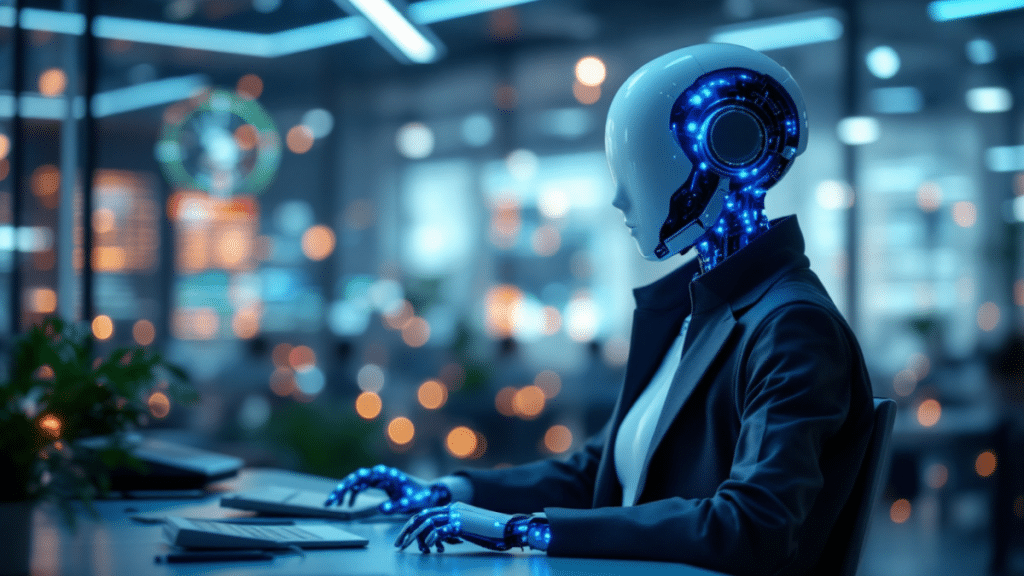Imagine a world where you never have to remember another password again. Well, as we step into 2025, this isn’t just a dream—it’s becoming our reality!
Artificial Intelligence (AI) is not only revolutionising how we secure our digital lives but is also reshaping entire industries, from healthcare to retail and everything in between. This technological renaissance is ushering in an era of efficiency, personalisation, and innovation.
The days of fumbling with complex passwords or relying on easily hackable security questions are numbered. AI-driven authentication systems are rapidly replacing these outdated methods, using sophisticated algorithms to recognise us by our behaviour patterns, biometrics, and even how we interact with our devices. But this is just the tip of the iceberg regarding AI’s transformative power.
If AI can replace passwords, what other industries can it revolutionise? Let’s find out.
The Power of AI in Security and Beyond
The cybersecurity community has long agreed that passwords are, as colourfully described by some experts, “hot garbage.” A recent RSA ID IQ report revealed that 51% of professionals have to enter their passwords at least six times a day, with 20% doing so more than 11 times. This friction has pushed enterprises to seek better solutions, with 61% planning to implement passwordless solutions by 2025.
AI promises to eliminate the approach to identity based on “what you know” and instead focus on “who you are” and “what you do” as normal patterns. This shift allows for more nuanced and secure authentication processes, potentially ending our reliance on insecure passwords sooner than many might expect.
But the impact of AI extends far beyond just replacing passwords. Let’s explore how AI is transforming various industries, reshaping the way businesses operate and interact with their customers.
How AI Is Changing the Game in Different Industries
Retail
The retail industry embraces AI to create more engaging and efficient shopping experiences. Key developments include dynamic pricing models that adjust in real-time based on demand and inventory levels, hyper-personalized product recommendations powered by AI algorithms, and automated inventory management systems that predict stock needs and optimise supply chains.
As we approach 2025, expect to see more AI-powered virtual shopping assistants and augmented reality experiences that blend the convenience of online shopping with the immersion of in-store visits.
iGaming
The iGaming industry is at the forefront of AI adoption, leveraging the technology to create highly personalised user experiences. AI algorithms analyse player behaviour, preferences, and patterns to offer tailored promotions and bonuses. For instance, AI-driven personalisation in the iGaming industry has led to innovative solutions like no wagering casino offers, which cater to players seeking transparent and straightforward bonuses without hidden conditions.
AI also enhances fraud detection and ensures fair play, creating a more secure and trustworthy gaming environment. As we move towards 2025, we can expect AI to further revolutionise iGaming with real-time personalised game recommendations, AI-powered virtual dealers and gaming assistants, and predictive analytics for responsible gaming initiatives.
Healthcare
In the healthcare sector, AI is making significant strides in improving patient outcomes and operational efficiency. By 2025, we can expect to see advanced diagnostic tools that can detect diseases earlier and with greater accuracy. AI-driven predictive analytics will forecast patient health trends and potential issues, while personalised treatment plans based on individual genetic makeup and lifestyle factors will become more common. These advancements promise not only to save lives but also to reduce healthcare costs and improve the overall quality of care.
Where AI Could Go Next?
Looking beyond 2025, several emerging areas are ripe for AI transformation. In education, we’ll see personalised learning paths and AI tutors adapting to individual student needs. Financial services will benefit from advanced fraud detection, algorithmic trading, and AI-powered financial advisors. Green technology will leverage AI for the optimization of renewable energy systems and smart grid management.
However, as AI becomes more integrated into these industries, we must also consider the ethical and regulatory implications. Issues such as data privacy, algorithmic bias, and the impact on employment will need to be addressed to ensure that AI benefits society as a whole.
As we stand on the brink of 2025, it’s clear that AI’s transformative potential extends far beyond replacing passwords. From the personalised experiences in iGaming to life-saving advancements in healthcare and revolutionary changes in retail, AI is reshaping industries in ways we’re only beginning to understand.
The journey towards AI integration will undoubtedly present challenges, but the potential benefits in efficiency, security, and personalisation are immense. As we move forward, businesses and policymakers must work together to harness the power of AI responsibly, ensuring that these technological advancements lead to a more secure, efficient, and user-friendly future for all.

